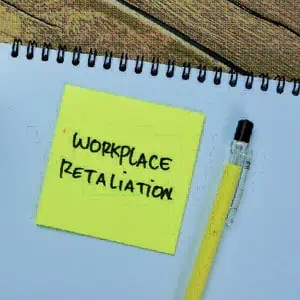Legal Protection From Workplace Retaliation

- The legal protections in place to prevent workplace retaliation.
- Effective ways managers can differentiate between legitimate performance actions and perceived retaliation.
- Steps employees should take if they believe they’re facing workplace retaliation.
What Are The Legal Protections To Prevent Or Address Workplace Retaliation?
The primary defenses against workplace retaliation are the anti-retaliation statutes under the Florida Civil Rights Act and Title VII. These statutes make it unlawful to terminate an employee for exercising their rights to report workplace discrimination or a hostile work environment based on their membership in a protected class, such as race, national origin, age, disability, religion, gender, and sex.
How Can Managers Differentiate Between Legitimate Performance Management Actions and Actions Perceived As Retaliation?
Managers can start by conducting a thorough investigation, preferably by someone uninvolved. For instance, if an employee has concerns about a supervisor, that supervisor shouldn’t lead the investigation. Many companies hire external, independent investigators or entrust their HR departments – who should act impartially – to handle such cases.
Courts typically will only question employers’ business decisions if there’s evident injustice. The primary role of a manager is to understand the root cause, engage with involved parties, and determine the legitimacy of the claims. Immediate and appropriate action is essential.
Often, when an employee raises a concern, placing the accused individual on paid leave during the investigation is beneficial. When employers neglect such measures or dismiss concerns without proper evaluation, it can lead to significant legal consequences.
What Steps Should Employees Take If They Believe They Are Facing Workplace Retaliation?
- Consult the HR Department or Follow the Reporting Chain: Corporate handbooks usually outline the process for reporting concerns. Adhering to these guidelines ensures you’ve fulfilled your responsibility.
- Reach Out to an Employment Lawyer: Experts, like the attorney in our conversation, often offer free consultations. An employment lawyer can guide you in filing a discrimination charge with entities like the Equal Employment Opportunity Commission (EEOC) and the Florida Commission without incurring any charges.
- Document Everything: Keep a detailed record of events. This can be invaluable when remembering specific incidents, especially when they accumulate over time. If ever in doubt or seeking advice, maintaining a daily journal about workplace occurrences can significantly bolster your case.
- Participate Actively in the Investigation: Engaging in the process, providing statements, and ensuring you have a written record of any terminations or significant interactions can solidify your stance.
Remember, standing up against perceived discrimination or unjust workplace practices is a protected activity. You’re safeguarding your rights and fostering a healthier work environment by voicing concerns.
An initial consultation is your next best step for more information on Legal Protection From Workplace Retaliation. Get the information and legal answers you seek by calling (954) 546-7608 today.

Call Now For A Personalized Consultation
(954) 546-7608
